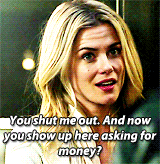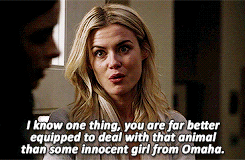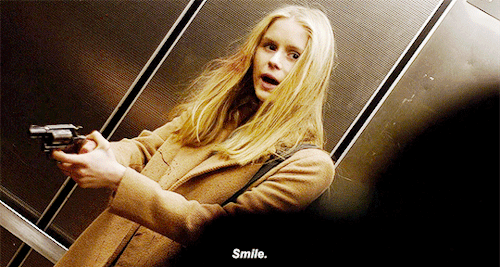There hasn’t been quite as much reading in Jennyland these days as I’d like; I keep picking books up and then casting them aside in a huff. Instead of that, I thought I’d recap Jessica Jones for those of you who aren’t yet sure whether you want to power through it. Here we are with all the things that happen in the show’s first episode, “AKA Ladies’ Night.” Do not read about them if you don’t want to be spoiled.
The latest of Marvel’s Netflix offerings, Jessica Jones is based on Brian Michael Bendis’s early-aughts comic Alias. Jessica, played by Krysten Ritter, is a mildly super-powered private investigator in New York City, trying to get away from an unspecified past trauma that’s left her with nightmares, insomnia, and a budding case of alcoholism.
Like its predecessor Daredevil, Jessica Jones is stylish as all hell. The noir influences are obvious from the jump, with camera clicks and Jessica’s voice-over across the first shots of the pilot. She gives us a weak opening salvo1, and the episode suffers from the task of introducing all its core characters and still fitting a plot in there. (It redeems itself at the end, though. We’ll come back to that.)
We meet Malcolm (Eka Darville), a perpetually stoned guy who lives in Jessica’s building, and Jeryn Hogarth (Carrie-Anne Moss), a high-powered defense attorney who is sleeping with her secretary, Pam, and who sometimes tosses Jessica a case. That is really all the descriptive information you’re ever going to need about those two people.
There’s also Luke Cage (Mike Colter), a really really hot bartender who eye-sexes Jessica all night at his bar, after which they return to his place for some actual sex. When they’re not flirting or having sex, Jessica’s spying on him, for reasons as yet unclear. Reports of Mike Colter and Krysten Ritter’s superb chemistry were not at all exaggerated.

All of this is rather poorly integrated into the episode’s main plot, which will also be the series’s main plot: A centrally-cast Midwestern couple, the Shlottmans, hire Jessica to look into the disappearance of their daughter, Hope.2 Two interviews and a couple of flashbacks later, Jessica figures out that Hope’s been taken by the same guy who traumatized the hell out of Jessica herself before his apparent death in a bus accident.
(Obviously Jessica doesn’t realize she’s in a comic book. In comic books nobody is ever really dead.)
As you will know if you have read Alias, or if you have friends who have read Alias and had long conversations with you about whether this goddamn show was just going to be another goddamn rapey bullshit festival3, the villain of the piece has powers of mind control. Jessica, like the practical-minded woman we know her to be, decides to skip town.
Which brings us to Trish.

Very often, when the internet says that someone is a beautiful cinnamon roll, too good for this world, too pure, I say, PIFFLE. But the thing about Trish is that she actually is.4 If you are watching the pilot of Jessica Jones for the first time, do not judge Trish on the basis of this episode alone. In this episode, she’s being Jessica’s conscience in a very uncool manner, where Jessica’s like “I have to leave town, this can’t happen to me again”5 and Trish is like:

As the viewer, you may see this and think, Wow, that’s very not cool of Trish to tell a rape survivor that it’s her responsibility to stop a guy she has no power to stop. And maybe you’ll turn against Trish. I am here to tell you that I find your reaction perfectly fair, yet I urge you to hang in there, because Trish will never, ever say anything so bullshitty again. Actually she will turn out pretty great. Promise.
Naturally, Jessica does not take off for foreign climes, but stays in New York to rescue Hope, and this is where we officially find out about Kilgrave’s mind control powers. Jessica finds Hope lying on a hotel bed in a puddle of her own urine, unable to move because Kilgrave told her not to. It’s a cleverly disturbing scene, as Jessica drags a screaming, fighting Hope off the bed and out of the hotel room. The viewer knows (and Hope knows, and Jessica knows) that this is rescue, but it looks like assault.
Of course, since I don’t need more scenes that look like assault, I vastly preferred the quiet moment that follows. Here we see Jessica at her softest, offering Hope the same mental exercises6 that we’ve seen her doing to calm her own fears. Hope’s parents arrive, tearful with relief, and for a moment it looks like we’re going to get a happy ending out of all this.
Except, as we’ll see over and over in this series, Jessica isn’t quite careful enough. She’s smart as a whip, but she’s also sloppy, and the Shlottmans are dead in the elevator before she can do anything about it. It’s a devastatingly effective end to a slightly up-and-down pilot.

Jessica Breaks Things: 1. The glass in her office/apartment door, which will become a recurring theme in the series. 2. A guy’s camera maybe?, when she’s investigating Hope — but the camera might be fine, really, so the episode’s primary casualty is that damn door.
Drinking Game Rules: Take a drink every time someone tells Malcolm to shut up because he’s high. If you’re drinking wine or beer, take a drink for voice-over; if you’re drinking anything stronger, probably best to leave that rule alone.